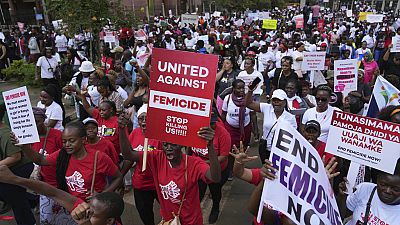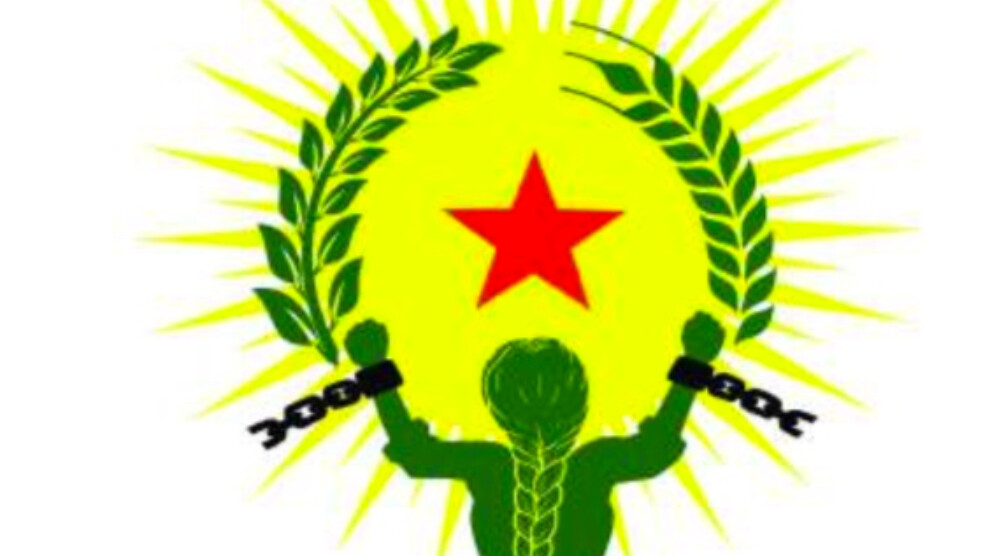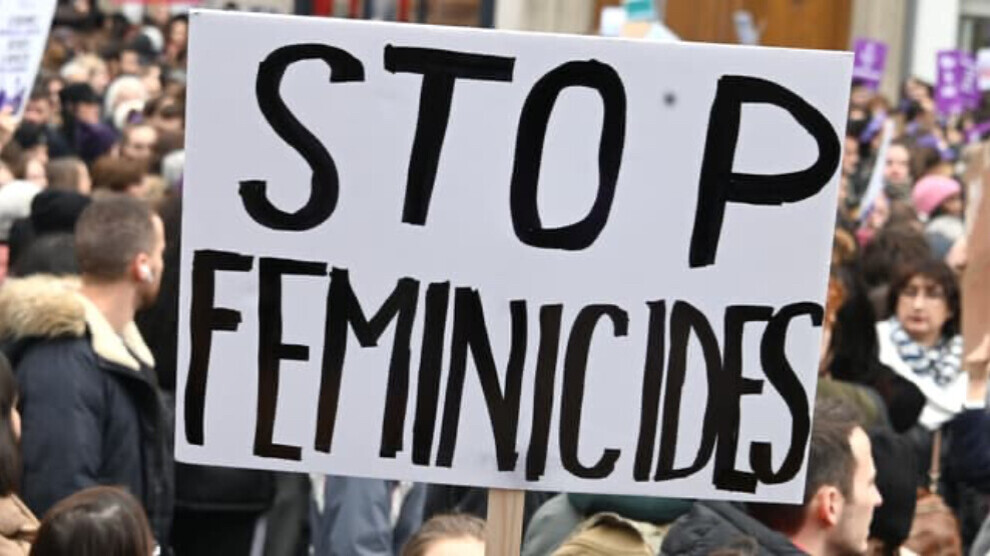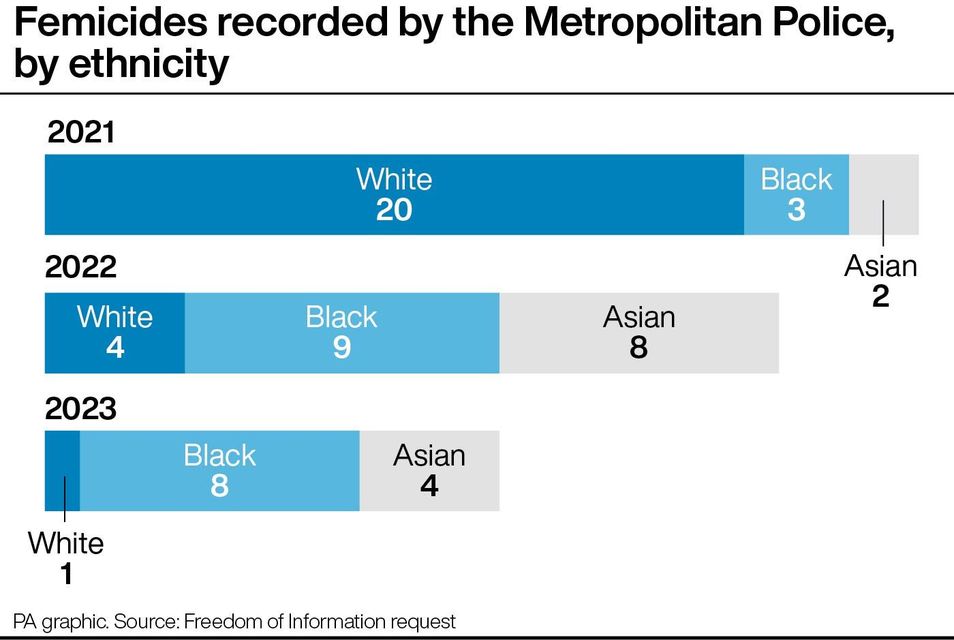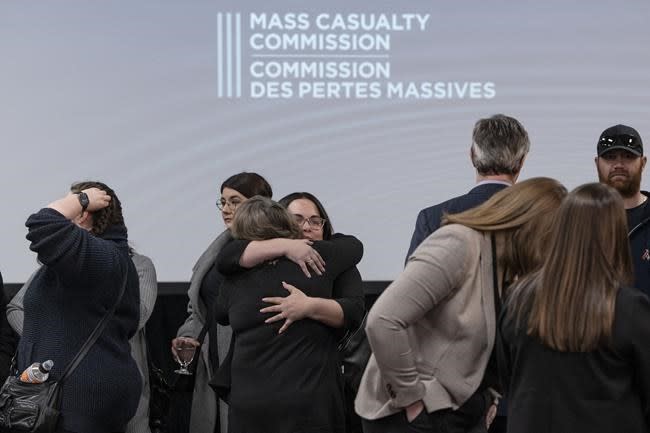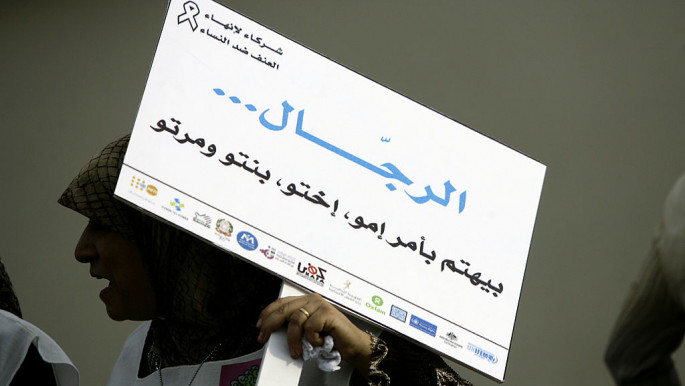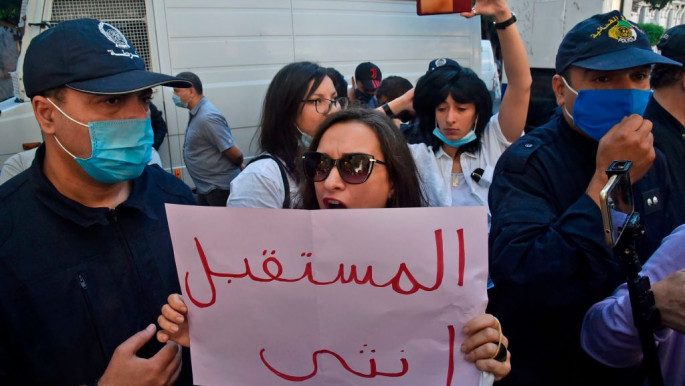By Naila Aroni
October 28, 2024
Source: Africa is a Country

Activists and relatives of Ugandan Olympic athlete Rebecca Cheptegei march calling for an end to femicide, 2024. Credit Andrew Kasuku / AP Photo
In Kenya, Olympic athlete Rebecca Cheptegi was brutally murdered—doused in petrol and set on fire by her ex-boyfriend just three weeks after returning from the Paris Olympics. In Switzerland, authorities recently revealed that Kristina Joksimovic, a former Miss Switzerland finalist, was killed by her husband, who confessed to the crime and allegedly dismembered her body and pureed it in a blender. In London, Cher Maximen was fatally stabbed in front of her daughter by a stranger while on her way to the Notting Hill Carnival.
Another day, another femicide globally. Although these incidents occurred separately, and these women live worlds apart, their deaths are tragically interconnected. While global homicide rates have generally declined, femicide has been steadily rising over the past two decades. In 2022, the UN recorded 89,000 cases of femicide globally, with 55% of these deaths caused by intimate partner violence or other perpetrators known to the victim. On average, this means that every 11 minutes, a woman or girl is killed somewhere in the world. In response to these troubling statistics, women across the globe have mobilized, with movements like #StopKillingUs in Kenya, #TotalShutdown in South Africa, and #NiUnaMenos in Latin America, fighting to end this violence.
Femicide is broadly understood as the killing of a woman or girl because of her gender—the most extreme form of gender-based violence. The 2012 UN Economic and Social Council’s Vienna Declaration on Femicide was the first to outline and recognize various forms of femicide, including intimate partner violence, targeted killings of women and girls in armed conflict, female infanticide, deaths related to genital mutilation, honor killings, and murders following accusations of witchcraft, among others.
Feminist scholars and activists have highlighted that femicide is not only about women and girls who have been killed, but also those who endure a continuum of gender-based violence, including ongoing violence, harassment, and assault. Academics Maya Dawsone and Saide Vega explain that femicide serves as a social barometer, reflecting the level of violence that women and girls experience, which may not always lead to death but can feel like a “slow death” for many. A contemporary example is the harrowing case of Gisele Pelicot in France, who discovered that her husband, Dominique Pelicot, had been drugging her for nearly a decade, inviting strangers to rape her in their home between 2011 and 2020 while filming the assaults as a form of “public revenge on men.” Pericot’s daughter describes the experience as a “slow descent into hell,” highlighting the horrifying sentiment of new cases of gender-based violence that emerge, challenging our perception of extreme violence.
While feminist movements have made significant strides in naming, recognizing, and advocating against femicide, it often seems as though the rest of the world remains disturbingly indifferent to this “silent pandemic,” carrying on with business as usual. The alarming rise in femicide, coupled with the relentless advocacy of feminists worldwide, makes it more urgent than ever to confront the root causes of this global epidemic of violence against women, and to take action to uproot it.
About 30% of women have experienced physical or sexual violence at least once in their lives. The Convention on the Elimination of All Forms of Discrimination against Women (CEDAW) 2005 recognized that femicide is not “isolated, sporadic or episodic cases of violence; rather they represent a structural situation and a social and cultural phenomenon deeply rooted in customs and mindsets.” One structural cause of femicide lies in how states and governments enable these killings—either through inadequate responses or a complete lack of action. Significant gaps in data collection also hinder the fight against femicide. Most data is drawn from national crime statistics or homicide records, which are often not gender-specific due to inconsistent criminal justice reporting across countries. As a result, the actual global rate of femicide is likely much higher. In many countries the lack of digital records further exacerbates these challenges, creating additional barriers to accurate data collection.
Government failures continue to play a key role in facilitating femicide—particularly through the lack of legal responses to domestic violence. Rebecca Cheptegi’s family highlighted this state-sanctioned femicide when they revealed that they reported her ex-boyfriend to Kenyan police, but authorities failed to respond to their plea for help, a failure that might have prevented her death. Political and economic factors also drive this troubling trend as national economies shape power dynamics within households and the public sphere. Economic hardship, particularly, threatens men’s livelihoods and social status, often escalating violence. Many countries have reported links between women’s murders and factors such as male unemployment and lack of income.
Furthermore, patriarchal traditions and norms that reinforce male dominance and female subordination, combined with external economic pressures, can result in gender-based violence. The expectation that men should be the primary breadwinners is a key component of patriarchal norms. When women out-earn their male partners, some men may feel emasculated and attempt to “restore” their perceived loss of power or control through violence. It has been speculated that Rebecca Cheptegei’s ex-boyfriend may have killed her over a land dispute, reflecting broader tensions around women’s increasing financial independence. This pattern may also explain the deaths of other Kenyan female Olympians, such as Agnes Tirop, who was similarly the breadwinner of her family and was murdered by her husband. Women across all social classes remain vulnerable to the threat of femicide, including celebrities whose partners may feel threatened by their economic and social status as public figures.
Mainstream approaches to ending femicide have largely focused on legal solutions and the criminal justice system. One example is the push to classify femicide as a distinct crime—in 2022, Cyprus incorporated femicide into its criminal code, making gender-related killings an aggravating factor in sentencing. Although classifying femicide as a distinct crime can aid in advocacy, awareness, and harm reduction, it remains limited by the broader shortcomings of carceral approaches. This classification alone is unlikely to serve as a strong deterrent to future crimes, and in many cases, gender-based violence laws exist but are poorly enforced.
Abolitionist feminists argue that criminalization is ineffective at protecting women but productive at reproducing harm. In Kenya, for example, conviction rates for sexual assault and rape are extremely low. Studies illustrate that only 6% of reported rape cases result in convictions. Contributing to the low conviction rates are factors such as policy inefficiencies, mishandling of DNA, lack of post-rape counseling and resources, and cultural stigmas. A carceral feminist politic, which relies on policing, prosecution, and imprisonment as the primary responses to gender-based violence, is ultimately myopic and can even be situationally dangerous for the victims seeking redress.
Effective measures seek to address the underlying socioeconomic inequalities and precarious conditions that contribute to violence against women. This includes providing financial support, accessible shelter, and economic empowerment for women reporting violence. For instance, cash transfer programs in low- and middle-income countries have shown a positive correlation between women’s income and lower rates of domestic violence. A successful example is South Africa’s IMAGE Programme (Intervention with Microfinance for AIDS and Gender Equity), which equips women with microfinance to enhance their economic independence. Additionally, governments must increase social spending on health and education to alleviate the burden on households, particularly the unpaid domestic labor that disproportionately falls on women.
Lastly, education and community outreach efforts must not only be inclusive of women but should also actively engage men, boys, and all other victims of patriarchal norms. Such education can dismantle deep-rooted cultural beliefs and harmful misrepresentations, like “boys will be boys” or the myth that a woman’s choice of dress justifies sexual assault. The Swedish government has consistently invested in educational programs aimed at addressing gender violence, including re-socializing boys by integrating gender equality into school curriculums. These efforts have contributed to Sweden’s relatively low levels of intimate partner violence and femicide, fostering a more gender-equal society.
Each day, cases of femicide remind us that ignorance of violence against women is deadly. Legal reforms, while essential, are not enough to end this crisis. To truly combat femicide, we must dismantle the deep-rooted inequalities, patriarchal norms, and systemic failures that sustain it. Femicide is not just a feminist issue, it’s everyone’s problem, and more people should be outraged. The time for action is now.
Naila Aronii is a writer and artist from Nairobi, Kenya.

Activists and relatives of Ugandan Olympic athlete Rebecca Cheptegei march calling for an end to femicide, 2024. Credit Andrew Kasuku / AP Photo
In Kenya, Olympic athlete Rebecca Cheptegi was brutally murdered—doused in petrol and set on fire by her ex-boyfriend just three weeks after returning from the Paris Olympics. In Switzerland, authorities recently revealed that Kristina Joksimovic, a former Miss Switzerland finalist, was killed by her husband, who confessed to the crime and allegedly dismembered her body and pureed it in a blender. In London, Cher Maximen was fatally stabbed in front of her daughter by a stranger while on her way to the Notting Hill Carnival.
Another day, another femicide globally. Although these incidents occurred separately, and these women live worlds apart, their deaths are tragically interconnected. While global homicide rates have generally declined, femicide has been steadily rising over the past two decades. In 2022, the UN recorded 89,000 cases of femicide globally, with 55% of these deaths caused by intimate partner violence or other perpetrators known to the victim. On average, this means that every 11 minutes, a woman or girl is killed somewhere in the world. In response to these troubling statistics, women across the globe have mobilized, with movements like #StopKillingUs in Kenya, #TotalShutdown in South Africa, and #NiUnaMenos in Latin America, fighting to end this violence.
Femicide is broadly understood as the killing of a woman or girl because of her gender—the most extreme form of gender-based violence. The 2012 UN Economic and Social Council’s Vienna Declaration on Femicide was the first to outline and recognize various forms of femicide, including intimate partner violence, targeted killings of women and girls in armed conflict, female infanticide, deaths related to genital mutilation, honor killings, and murders following accusations of witchcraft, among others.
Feminist scholars and activists have highlighted that femicide is not only about women and girls who have been killed, but also those who endure a continuum of gender-based violence, including ongoing violence, harassment, and assault. Academics Maya Dawsone and Saide Vega explain that femicide serves as a social barometer, reflecting the level of violence that women and girls experience, which may not always lead to death but can feel like a “slow death” for many. A contemporary example is the harrowing case of Gisele Pelicot in France, who discovered that her husband, Dominique Pelicot, had been drugging her for nearly a decade, inviting strangers to rape her in their home between 2011 and 2020 while filming the assaults as a form of “public revenge on men.” Pericot’s daughter describes the experience as a “slow descent into hell,” highlighting the horrifying sentiment of new cases of gender-based violence that emerge, challenging our perception of extreme violence.
While feminist movements have made significant strides in naming, recognizing, and advocating against femicide, it often seems as though the rest of the world remains disturbingly indifferent to this “silent pandemic,” carrying on with business as usual. The alarming rise in femicide, coupled with the relentless advocacy of feminists worldwide, makes it more urgent than ever to confront the root causes of this global epidemic of violence against women, and to take action to uproot it.
About 30% of women have experienced physical or sexual violence at least once in their lives. The Convention on the Elimination of All Forms of Discrimination against Women (CEDAW) 2005 recognized that femicide is not “isolated, sporadic or episodic cases of violence; rather they represent a structural situation and a social and cultural phenomenon deeply rooted in customs and mindsets.” One structural cause of femicide lies in how states and governments enable these killings—either through inadequate responses or a complete lack of action. Significant gaps in data collection also hinder the fight against femicide. Most data is drawn from national crime statistics or homicide records, which are often not gender-specific due to inconsistent criminal justice reporting across countries. As a result, the actual global rate of femicide is likely much higher. In many countries the lack of digital records further exacerbates these challenges, creating additional barriers to accurate data collection.
Government failures continue to play a key role in facilitating femicide—particularly through the lack of legal responses to domestic violence. Rebecca Cheptegi’s family highlighted this state-sanctioned femicide when they revealed that they reported her ex-boyfriend to Kenyan police, but authorities failed to respond to their plea for help, a failure that might have prevented her death. Political and economic factors also drive this troubling trend as national economies shape power dynamics within households and the public sphere. Economic hardship, particularly, threatens men’s livelihoods and social status, often escalating violence. Many countries have reported links between women’s murders and factors such as male unemployment and lack of income.
Furthermore, patriarchal traditions and norms that reinforce male dominance and female subordination, combined with external economic pressures, can result in gender-based violence. The expectation that men should be the primary breadwinners is a key component of patriarchal norms. When women out-earn their male partners, some men may feel emasculated and attempt to “restore” their perceived loss of power or control through violence. It has been speculated that Rebecca Cheptegei’s ex-boyfriend may have killed her over a land dispute, reflecting broader tensions around women’s increasing financial independence. This pattern may also explain the deaths of other Kenyan female Olympians, such as Agnes Tirop, who was similarly the breadwinner of her family and was murdered by her husband. Women across all social classes remain vulnerable to the threat of femicide, including celebrities whose partners may feel threatened by their economic and social status as public figures.
Mainstream approaches to ending femicide have largely focused on legal solutions and the criminal justice system. One example is the push to classify femicide as a distinct crime—in 2022, Cyprus incorporated femicide into its criminal code, making gender-related killings an aggravating factor in sentencing. Although classifying femicide as a distinct crime can aid in advocacy, awareness, and harm reduction, it remains limited by the broader shortcomings of carceral approaches. This classification alone is unlikely to serve as a strong deterrent to future crimes, and in many cases, gender-based violence laws exist but are poorly enforced.
Abolitionist feminists argue that criminalization is ineffective at protecting women but productive at reproducing harm. In Kenya, for example, conviction rates for sexual assault and rape are extremely low. Studies illustrate that only 6% of reported rape cases result in convictions. Contributing to the low conviction rates are factors such as policy inefficiencies, mishandling of DNA, lack of post-rape counseling and resources, and cultural stigmas. A carceral feminist politic, which relies on policing, prosecution, and imprisonment as the primary responses to gender-based violence, is ultimately myopic and can even be situationally dangerous for the victims seeking redress.
Effective measures seek to address the underlying socioeconomic inequalities and precarious conditions that contribute to violence against women. This includes providing financial support, accessible shelter, and economic empowerment for women reporting violence. For instance, cash transfer programs in low- and middle-income countries have shown a positive correlation between women’s income and lower rates of domestic violence. A successful example is South Africa’s IMAGE Programme (Intervention with Microfinance for AIDS and Gender Equity), which equips women with microfinance to enhance their economic independence. Additionally, governments must increase social spending on health and education to alleviate the burden on households, particularly the unpaid domestic labor that disproportionately falls on women.
Lastly, education and community outreach efforts must not only be inclusive of women but should also actively engage men, boys, and all other victims of patriarchal norms. Such education can dismantle deep-rooted cultural beliefs and harmful misrepresentations, like “boys will be boys” or the myth that a woman’s choice of dress justifies sexual assault. The Swedish government has consistently invested in educational programs aimed at addressing gender violence, including re-socializing boys by integrating gender equality into school curriculums. These efforts have contributed to Sweden’s relatively low levels of intimate partner violence and femicide, fostering a more gender-equal society.
Each day, cases of femicide remind us that ignorance of violence against women is deadly. Legal reforms, while essential, are not enough to end this crisis. To truly combat femicide, we must dismantle the deep-rooted inequalities, patriarchal norms, and systemic failures that sustain it. Femicide is not just a feminist issue, it’s everyone’s problem, and more people should be outraged. The time for action is now.
Naila Aronii is a writer and artist from Nairobi, Kenya.
